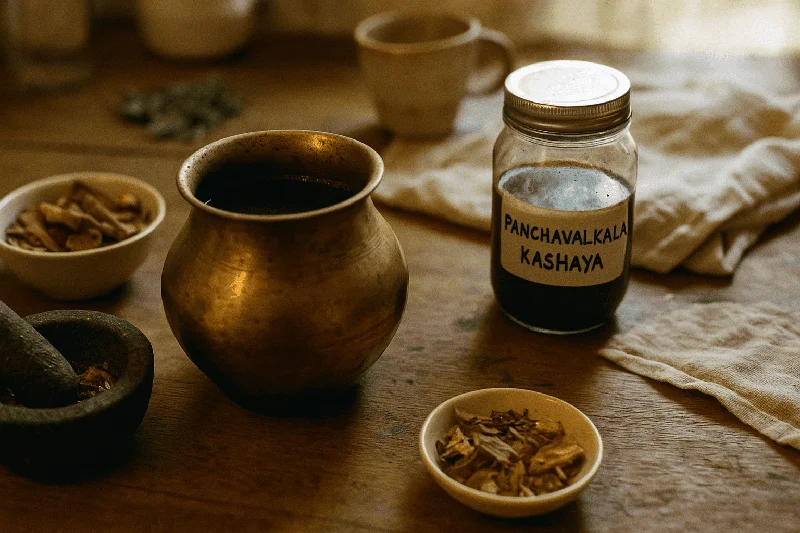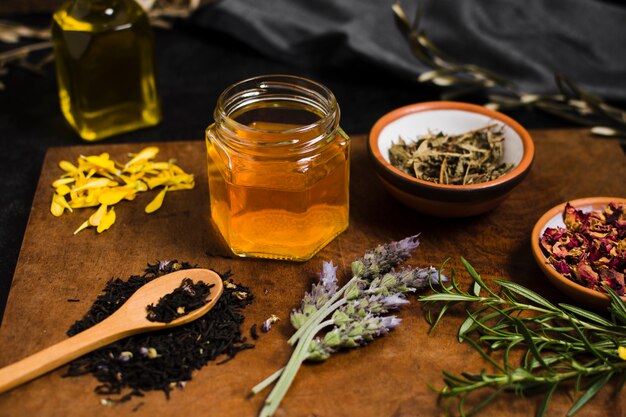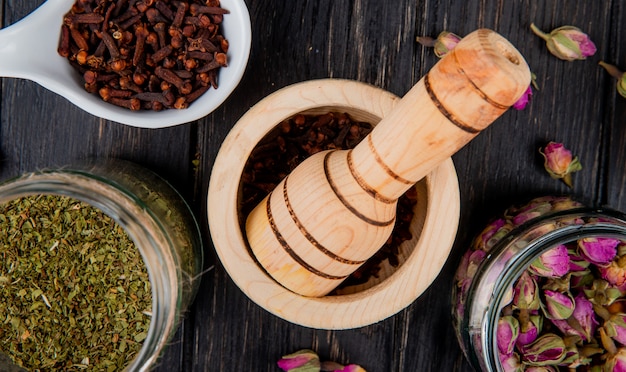Ask Ayurvedic doctor a question and get a consultation online on the problem of your concern in a free or paid mode. More than 2,000 experienced doctors work and wait for your questions on our site and help users to solve their health problems every day.
Panchavalkala Kashaya – Traditional Ayurvedic Herbal Decoction for Wound Healing & Skin Health

Introduction to Panchavalkala Kashaya
Panchavalkala Kashaya is a revered Ayurvedic decoction crafted from the bark of five potent trees. Celebrated for its remarkable wound healing and skin restorative properties, this herbal remedy is designed to soothe inflammation, promote tissue regeneration, and maintain overall skin health. By incorporating panchavalkala kashaya into your wellness routine, you tap into ancient Ayurvedic wisdom to support natural healing and enhance skin resilience.
Don't wait or self medicate. Start chat with Doctor NOW
Historical Roots & Ayurvedic Significance
Historically, panchavalkala kashaya has been a cornerstone of Ayurvedic medicine, valued for its efficacy in treating wounds, burns, and various skin ailments. Ancient Ayurvedic texts describe the decoction as a potent remedy for cleansing and healing, owing to its ability to balance the body's doshas, particularly Pitta and Kapha. The tradition of using the five barks stems from a deep understanding of nature's healing properties, emphasizing a holistic approach that nurtures the body's innate ability to regenerate and recover.
Key Components & Therapeutic Benefits
1. Herbal Composition
Panchavalkala kashaya is derived from the bark of five specific trees, each contributing unique healing properties:
- Vata (Ficus benghalensis): Known for its astringent and cooling effects, it aids in reducing inflammation.
- Udumbara (Ficus racemosa): Supports wound healing and helps in restoring skin integrity.
- Ashwatha (Ficus religiosa): Renowned for its detoxifying properties, it purifies the skin.
- Plaksha (Ficus lacor): Provides anti-inflammatory benefits and soothes skin irritations.
- Parisha (Thespesia populnea): Enhances tissue repair and promotes overall skin health.
2. Wound Healing & Skin Restoration
The decoction’s astringent nature helps tighten skin tissues, reduce excess moisture, and prevent infections in wounds. Panchavalkala kashaya aids in:
- Accelerating the healing process of cuts, abrasions, and burns.
- Reducing inflammation and soothing irritated skin.
- Promoting regeneration of healthy skin cells.
- Maintaining the skin's natural balance by cleansing impurities.
3. Detoxification & Dosha Balancing
By stimulating digestion and detoxification, panchavalkala kashaya supports the elimination of toxins (ama) from the body. This detoxifying effect not only enhances wound healing but also contributes to a balanced state of Pitta and Kapha, leading to improved skin clarity and resilience.
4. Integration with Ayurvedic Therapies
For enhanced therapeutic outcomes, panchavalkala kashaya is often used in conjunction with other Ayurvedic practices such as:
- Panchakarma: A detoxification therapy that complements the cleansing properties of the decoction.
- Abhyanga (Ayurvedic Oil Massage): Facilitates better absorption of herbal ingredients.
- Swedana (Herbal Steam Therapy): Opens pores and aids in deeper detoxification.
How Panchavalkala Kashaya Works: The Science Behind the Decoction
The efficacy of panchavalkala kashaya lies in its rich phytochemical composition. The bioactive compounds in the barks contribute to its astringent, anti-inflammatory, and antimicrobial properties. These compounds help modulate immune responses, reduce oxidative stress, and promote the natural repair mechanisms of the skin. The synergistic action of the five barks ensures that toxins are effectively eliminated while supporting the regeneration of healthy tissues, making the decoction a powerful tool for wound management and skin rejuvenation.
Guidelines for Choosing the Right Treatment
When opting for panchavalkala kashaya, consider the following recommendations:
- Consult a Qualified Ayurvedic Practitioner: Ensure the decoction is appropriate for your individual constitution (Prakriti) and specific health needs.
- Source Authentic Products: Choose formulations made from high-quality, organic herbal barks to guarantee safety and effectiveness.
- Adopt Complementary Lifestyle Practices: Support the healing process with a balanced diet, proper hydration, and stress management techniques.
- Integrate with Holistic Therapies: Consider combining the decoction with Panchakarma, Abhyanga, or Swedana for enhanced results.
Recommended Dosage & Usage
The administration of panchavalkala kashaya should be personalized according to individual health conditions. Typically:
- Dosage: A small quantity, generally 15-30 ml of the decoction, is taken once or twice daily.
- Method: It is advisable to consume the decoction on an empty stomach or as directed by an Ayurvedic expert.
- Enhancing Effectiveness: For improved palatability and absorption, the decoction can be diluted with warm water or mixed with natural sweeteners.
- Professional Guidance: Always adhere to the recommendations provided by a certified Ayurvedic practitioner to tailor the dosage appropriately.
Potential Side Effects & Precautions
While panchavalkala kashaya is largely safe when used correctly, it is important to observe the following precautions:
- Digestive Sensitivity: Some individuals might experience mild digestive disturbances, especially during the initial detox phase.
- Pregnancy & Nursing: Consult an Ayurvedic practitioner before use if you are pregnant or breastfeeding.
- Allergic Reactions: Discontinue use if any signs of allergic reactions or adverse effects occur.
- Gradual Introduction: It is advisable to start with a lower dose and gradually increase it as tolerated and recommended.
Frequently Asked Questions
How does Panchavalkala Kashaya promote wound healing?
Panchavalkala kashaya accelerates wound healing by reducing inflammation, promoting tissue regeneration, and cleansing the wound site, which helps in faster recovery and prevention of infection.
What are the key herbal ingredients in Panchavalkala Kashaya?
The decoction is prepared from the barks of five trees: Vata, Udumbara, Ashwatha, Plaksha, and Parisha. Each contributes unique anti-inflammatory and healing properties essential for skin health.
Can Panchavalkala Kashaya be used alongside other Ayurvedic therapies?
Yes, panchavalkala kashaya is often integrated with Panchakarma, Abhyanga, and Swedana to enhance its detoxifying and healing effects, providing a more comprehensive treatment approach.
Is Panchavalkala Kashaya effective for all types of skin conditions?
While primarily known for wound healing and skin restoration, the decoction can be beneficial for various skin ailments. However, its suitability depends on individual conditions and should be used under professional guidance.
What dietary practices support the effectiveness of Panchavalkala Kashaya?
A detoxifying diet rich in fresh fruits, vegetables, whole grains, and adequate water intake supports the cleansing process and enhances the benefits of panchavalkala kashaya.
How long does it take to notice improvements with Panchavalkala Kashaya?
The timeframe for noticeable improvements may vary depending on the severity of the condition and individual constitution. Some may observe positive changes within a few weeks, while others might require a longer duration for optimal results.
Where can I obtain authentic Panchavalkala Kashaya?
Authentic panchavalkala kashaya can be sourced from reputable Ayurvedic pharmacies and certified practitioners. Always verify the authenticity and quality of the product before use.
Conclusion & Expert Insights
Panchavalkala kashaya is a powerful Ayurvedic herbal decoction that embodies the wisdom of traditional healing practices. Its unique blend of five potent barks not only accelerates wound healing and reduces inflammation but also supports overall skin health and detoxification. By consulting with qualified Ayurvedic professionals and integrating panchavalkala kashaya into a balanced lifestyle, individuals can harness its full potential for improved skin resilience and holistic well-being.
References
- Sharma, P.V. (1995). Ayurvedic Healing: A Comprehensive Guide.
- Lad, V. (2002). Ayurveda: The Science of Self-Healing.
- Dash, B. (2010). Traditional Ayurvedic Approaches to Wound Healing.
- National Institute of Ayurveda. Retrieved from
- Chopra, D. (2004). Perfect Health: The Complete Mind/Body Guide.



